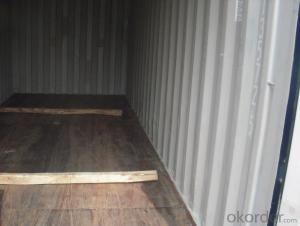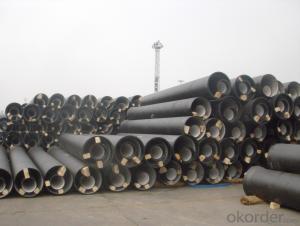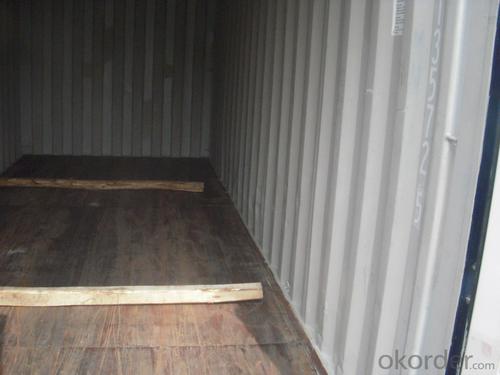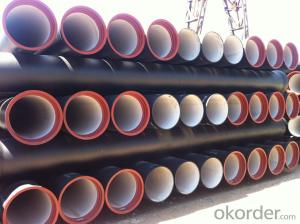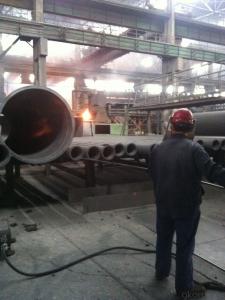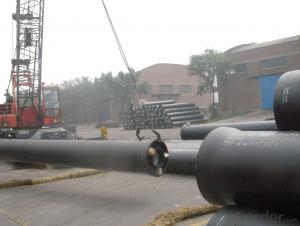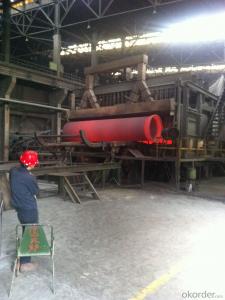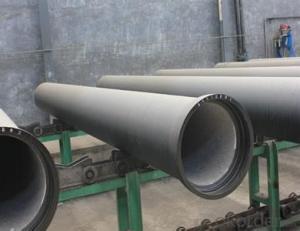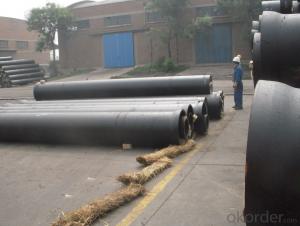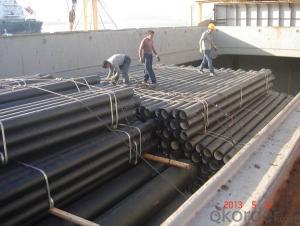DUCTILE IRON PIPE AND PIPE FITTINGS K7 CLASS DN1300
- Loading Port:
- Tianjin
- Payment Terms:
- TT OR LC
- Min Order Qty:
- 23 pc
- Supply Capability:
- 3000 pc/month
OKorder Service Pledge
OKorder Financial Service
You Might Also Like
· Material : Ductile Cast Iron
· Size Range : DN 80mm to DN 2000mm
· Unit Effective Length : 6m or 5.7m
· Manufacture Standard: ISO 2531:1998/ EN 545:2006/EN 598:2007
· Annual capacity : 200,000 tons
· Coating Exterior: Zinc 130g/m2 according to ISO 8179-1 and bitumen coating 70 microns.
· Cement Interior: Portland Cement/ High Alumina Cement/ Sulphate Resisting Cement Lining according to ISO 4179
· Special requirements on external coating and internal lining can be applied
· We also provide accessories such as SBR/EPDM rubber gaskets, lubricant paste, pipe caps, PE sleeves, etc.
Additional Parts:
Each pipe is strictly inspected according to related standard to ensure permanently high performance.
Easy Installation at site and service free for life
Long Service Lifespan
Quotation will arrive you within 24hours once we get your inquiry.
We guarantee offering you a competitive price.
A copy of original inspection reports of pipes will be offered after shipment.
Photos of loading process will be sent to the customer after shipment effect.
We will follow-up the delivery progress after shipment effect and update to the customer on weekly basis.
- Q: How do ductile iron pipes perform in high-temperature water applications?
- Ductile iron pipes are known for their strength, durability, and excellent mechanical properties, which make them suitable for a wide range of applications. However, when it comes to high-temperature water applications, certain considerations need to be taken into account. Ductile iron pipes generally perform well in high-temperature water applications up to a certain threshold. The exact temperature limit depends on the specific grade of ductile iron used and the duration of exposure to high temperatures. In general, ductile iron pipes can withstand temperatures up to 350-400 degrees Fahrenheit for short periods without significant degradation or loss of strength. However, it is important to note that prolonged exposure to high temperatures can have detrimental effects on ductile iron pipes. At elevated temperatures, ductile iron pipes may experience a phenomenon called thermal degradation, which can lead to reduced mechanical properties, increased brittleness, and even cracking or failure over time. To mitigate the risks associated with high-temperature water applications, several measures can be taken. Firstly, selecting the appropriate grade of ductile iron with a higher temperature tolerance can enhance the pipe's performance. Secondly, implementing proper insulation or heat shielding measures can help minimize the direct heat transfer to the pipes, thereby reducing the potential for thermal degradation. Additionally, regular monitoring and maintenance of ductile iron pipes in high-temperature water applications are crucial to identify any signs of degradation or damage early on and take appropriate remedial actions to prevent failure. In summary, while ductile iron pipes can generally perform well in high-temperature water applications, it is important to carefully consider the specific conditions and requirements of the application to ensure their long-term performance and integrity.
- Q: Are ductile iron pipes suitable for industrial water systems?
- Ductile iron pipes, well-known for their strength, durability, and resistance to corrosion, are a perfect choice for industrial water systems. With the capability to withstand high-pressure and heavy-duty applications, these pipes are ideal for transporting water in large-scale industrial facilities like power plants, factories, and chemical plants. Moreover, ductile iron pipes can handle a broad range of temperatures, making them suitable for both hot and cold water systems. Their inherent flexibility allows for easy installation and maintenance, enhancing their suitability for industrial water systems. In conclusion, ductile iron pipes offer a dependable and economical solution for industrial water transportation requirements.
- Q: Are ductile iron pipes suitable for use in geothermal applications?
- Geothermal applications can benefit from the use of ductile iron pipes. These pipes possess qualities such as strength, durability, and corrosion resistance, which are crucial for geothermal systems. In the realm of geothermal systems, which involve utilizing the Earth's heat for energy generation or building heating and cooling, ductile iron pipes are well-regarded. They are capable of enduring high temperatures and pressures without compromising their structural integrity. This ability to withstand thermal expansion and contraction ensures a dependable and long-lasting piping solution. Moreover, ductile iron pipes exhibit exceptional resistance to corrosion, making them ideal for the potentially corrosive environment often encountered in geothermal applications. This resistance guarantees that the pipes will not deteriorate over time, thus maintaining the system's integrity and minimizing the risk of leaks or failures. Additionally, ductile iron pipes possess a smooth interior surface, which aids in reducing pressure loss and energy consumption in geothermal systems. The smoothness of these pipes also lowers the likelihood of mineral deposits or scaling buildup, promoting efficient and uninterrupted heat transfer. All in all, ductile iron pipes prove to be a suitable choice for geothermal applications due to their strength, durability, corrosion resistance, thermal stability, and smooth interior surface. They offer a reliable and efficient piping solution capable of withstanding the demanding conditions of geothermal systems while ensuring long-term performance and minimal maintenance requirements.
- Q: Can ductile iron pipes be repaired if they are damaged?
- Yes, ductile iron pipes can be repaired if they are damaged. Various repair methods, such as spot repair or full line replacement, can be employed depending on the extent and nature of the damage. Experienced technicians can assess the damage and determine the most suitable repair technique to restore the functionality and integrity of the ductile iron pipes.
- Q: Can ductile iron pipes be used in seismic zones?
- Indeed, in seismic zones, ductile iron pipes are suitable for use. These pipes possess remarkable strength and flexibility, enabling them to endure ground movement and seismic events. Their capacity to absorb and disperse the forces generated by earthquakes reduces the likelihood of pipe failure or harm. Moreover, ductile iron pipes have been effectively employed in seismic zones for numerous years, with their performance confirmed by various examinations and assessments. Nevertheless, adhering to the proper design and installation guidelines is crucial to guarantee the optimal operation and safety of ductile iron pipes in seismic zones.
- Q: Can ductile iron pipes be used for oil and gas pipelines?
- Yes, ductile iron pipes can be used for oil and gas pipelines. Ductile iron is a strong and durable material that is resistant to corrosion, making it suitable for transporting oil and gas over long distances. Additionally, ductile iron pipes have excellent pressure-bearing capabilities, making them capable of withstanding the high pressures often associated with oil and gas transportation. Furthermore, ductile iron pipes are relatively easy to install and maintain, which adds to their suitability for oil and gas pipelines. However, it is important to note that the specific application and conditions of the pipeline must be considered, and consulting with industry experts is recommended to ensure the proper selection and installation of ductile iron pipes for oil and gas transportation.
- Q: How do ductile iron pipes handle soil erosion?
- Ductile iron pipes are highly resistant to soil erosion due to their robust construction and inherent strength. The pipes' durable and flexible nature allows them to withstand the impact of soil movement and erosion without significant damage. Moreover, the corrosion-resistant coatings applied to ductile iron pipes further enhance their ability to resist erosion caused by soil particles and other corrosive elements. Overall, ductile iron pipes provide a reliable and long-lasting solution for handling soil erosion in various applications.
- Q: How does ductile iron pipe perform in sandy or unstable soils?
- Ductile iron pipe performs exceptionally well in sandy or unstable soils due to its inherent strength and flexibility. The composition of ductile iron, which includes a combination of iron, carbon, and small amounts of other elements, gives it superior mechanical properties compared to other types of pipes. In sandy soils, where there is a risk of pipe movement and deformation due to shifting ground, ductile iron's high tensile strength and elongation characteristics allow it to withstand the pressure and stress without fracturing or breaking. Its flexibility enables it to accommodate the movement and settlement of the surrounding soil, reducing the risk of pipe failure. Moreover, ductile iron pipe's resistance to corrosion makes it highly suitable for installation in sandy soils. The protective lining and coatings applied to the interior and exterior of the pipe prevent the soil's corrosive elements from attacking the iron, ensuring long-term durability and reliability. In unstable soils with varying compaction levels or weak load-bearing capacity, ductile iron pipe's sturdy construction provides stability and support. Its robustness allows it to distribute the loads evenly, minimizing the risk of pipe deflection or collapse. Additionally, ductile iron pipe's joint design and sealing methods, such as push-on joints or mechanical joints with rubber gaskets, offer excellent leak resistance and prevent soil infiltration, further enhancing its performance in sandy or unstable soils. Overall, ductile iron pipe's combination of strength, flexibility, corrosion resistance, and reliable joint systems make it an ideal choice for applications in sandy or unstable soils, providing a long-lasting and efficient solution for water and wastewater transmission.
- Q: What is the content of silicon in silicon molybdenum ductile iron?
- Silicon molybdenum material, similar to the United States IDM5381, 5402 and other brands, engaged in automotive components (such as turbocharger parts), and other heat resistant parts have been exposed to high temperature
- Q: How do ductile iron pipes handle pipe deflection?
- Ductile iron pipes have high flexibility and strength, allowing them to handle pipe deflection effectively. They can withstand moderate deflection without causing significant damage or compromising their structural integrity. This flexibility is due to the ductile nature of the iron used in their construction, which allows them to bend and adapt to changes in the ground or surrounding environment. Overall, ductile iron pipes are well-suited for handling pipe deflection situations.
Send your message to us
DUCTILE IRON PIPE AND PIPE FITTINGS K7 CLASS DN1300
- Loading Port:
- Tianjin
- Payment Terms:
- TT OR LC
- Min Order Qty:
- 23 pc
- Supply Capability:
- 3000 pc/month
OKorder Service Pledge
OKorder Financial Service
Similar products
Hot products
Hot Searches
Related keywords
